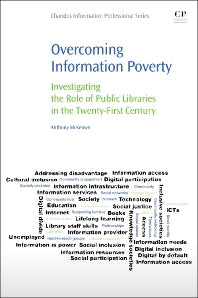Freshly Printed - allow 10 days lead
Couldn't load pickup availability
Overcoming Information Poverty
Investigating the Role of Public Libraries in The Twenty-First Century
This engaging book proposes a model for understanding the concept of information poverty, develops indicators for its measurement, and provides recommendations for service improvement based on analysis of public library services at macro (strategic), meso (community) and micro (individual) levels.
Anthony Mckeown (Author)
9780081011102, Elsevier Science
Paperback / softback, published 6 July 2016
268 pages
22.9 x 15.1 x 1.8 cm, 0.3 kg
Overcoming Information Poverty: Investigating the Role of Public Libraries in The Twenty-First Century considers the role of public libraries in alleviating information poverty and targeting social exclusion, using a three-level information poverty framework. The book proposes a model for understanding the concept of information poverty, develops indicators for its measurement, and provides recommendations for service improvement based on analysis of public library services at macro (strategic), meso (community) and micro (individual) levels. The topic is of theoretical and practical importance when considering the changing role of public libraries today. The book is the first time a macro, meso, and micro model of information poverty indicators has been developed and applied to illustrate the impact of public libraries at strategic, community, and personal levels.
Chapter One: Introduction Chapter Two: Reviewing the Literature Chapter Three: Setting the Context Chapter Four: Developing Information Poverty Indicators Chapter Five: Methodology Chapter Six: Macro Level Findings – Strategic perspectives and approaches to addressing information poverty Chapter Seven: Meso Level Findings – Community perspectives and approaches to addressing information poverty in socially deprived areas Chapter Eight: Micro Level Findings – Reflecting on library user and non-user perspectives of public libraries Chapter Nine: Synthesis, discussion, recommendations and conclusions
Subject Areas: Academic & specialist libraries [GLMA], Library, archive & information management [GLC], Library & information sciences [GL]


